Text
Bruce Springsteen: “Trust is a fragile thing. It requires allowing others to see as much of ourselves as we have the courage to reveal. But “Brilliant Disguise” postulates that when you drop one mask, you find another behind it until you begin to doubt your own feelings about who you are.”
Films7 on X/Twitter (Born to Run, Chapter 51. 'Tunnel of Love')
youtube
Bruce Springsteen - Brilliant Disguise (Official Video)
#music#bruce springsteen#songwriting#springsteen#love#trust#mask#born to run#autobiography#who you are#book#singer#songwriter#rock star#Brilliant Disguise#tunnel of love#Youtube
7 notes
·
View notes
Text
74 years old, Bruce Springsteen, still roaring: 'And left us running, burned and blind, Chasing something in the night'
Chase Center, San Francisco, 28 March 2024
films7 on twitter
#music#bruce springsteen#springsteen#songwriting#darkness on the edge of town#something in the night#san francisco#singer#california#chase center#live#concert#rock and roll#rock star
14 notes
·
View notes
Text
René Girard: The ‘jealousy’ that Cain feels toward his brother is inseparable from the deprivation of sacrificial outlet that defines the character. We can only deceive violence to the extent that we do not deprive it of all outlet, where we provide it with something to sink its teeth into.
'Adam Raised a Cain', Bruce Springsteen
French text on X/Twitter: films7
René Girard: “We can only deceive violence to the extent that we do not deprive it of all outlet, where we provide it with something to sink its teeth into. Perhaps this is what the story of Cain and Abel signifies, among other things. The biblical text provides only one detail about each brother. Cain tills the land and offers to God the fruits of his harvest. Abel is a shepherd; he sacrifices the firstborn of his flocks. One of the brothers kills the other, and it is the one who does not have this deceptive violence of animal sacrifice. This difference between sacrificial worship and non-sacrificial worship is truly one with God’s judgment in favor of Abel. To say that God approves of Abel’s sacrifices and does not approve of Cain’s offerings is to restate, in another language, the divine language, that Cain kills his brother while Abel does not.
In the Old Testament and Greek myths, brothers are almost always enemies. The violence they seem inevitably called to exercise against each other can only dissipate on third-party victims, sacrificial victims. The 'jealousy’ that Cain feels toward his brother is inseparable from the deprivation of sacrificial outlet that defines the character.”
youtube
Adam Raised a Cain (Bruce Springsteen Live at The Paramount Theatre 2009)
3 notes
·
View notes
Text
'I live on a lotta different levels, y’know.'
Bruce Springsteen: I eat loneliness, man. I feed off it. The loner thing started from the very beginning. It was like I didn’t exist. It was the wall, then me. But I was working on the inside
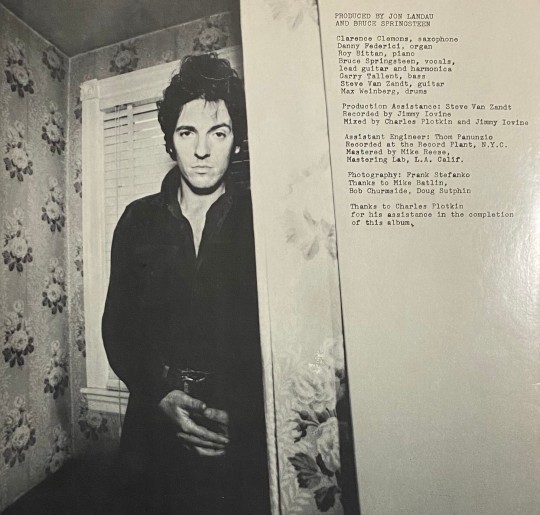
Bruce Springsteen, 1978, about his youth:
“It was like I didn’t exist. It was the wall, then me. But I was working on the inside all the time. A lot of rock and roll people went through this solitary existence. If you’re gonna be good at something, you’ve gotta be alone a lot to practice. There has to be a certain involuntariness to it. Like my youngest sister, she could play if she wanted to. But she’s too pretty. She’s popular, you know what I mean? She ain’t gonna sit in the house in her room no eight hours a day and play the piano. No way.”
Dave Marsh: "Springsteen is a loner by nature. Even today, he is the sort of person whose favorite moments often involve being alone: speeding down a highway, or just soaking up the atmosphere at four A.M. on a deserted street."
Bruce Springsteen: “The loner thing started from the very beginning. My father’s entire family were outsiders. They didn’t give a damn what anybody thought.”
youtube
Video: Bruce Springsteen dancing on stage with his mother then playing with his sister: Dancing in the Dark, London 2013

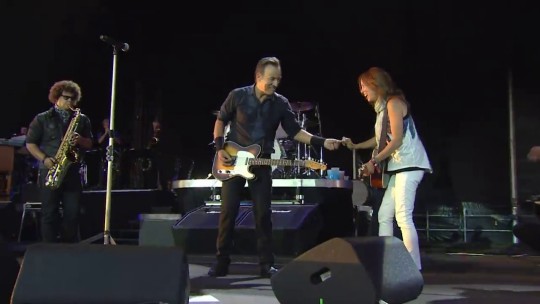
Bruce Springsteen with his mother, and his sister.
youtube
"In fact, what was troubling Bruce personally was not far removed from what he’d already conceived as the central problem The River had tried to tackle: “People want to be part of a group yet they also want to disassociate themselves. People go through those conflicts every day in little ways: Do you wanna go to the movies tonight with your friends, or stay home? I wanted to get part of that on the record—the need for community, which is what ‘Out in the Street’ is about. Songs like The Ties That Bind’ and Two Hearts’ deal with that, too. But there’s also the other side, the need to be alone.”
Bruce was beginning to feel the downside of his loner’s life—his need to be alone was becoming something tougher, more pernicious: loneliness. He later compared his emotions to the scene in The Grapes of Wrath in which an Okie farmer tries to hold off eviction with a shotgun, only to be told that the men he wants to shoot are faceless, hidden away in boardrooms hundreds of miles away. “I felt the same way he did: Where do I point the gun?” Bruce said. “In the Seventies and Eighties, especially compared to the Sixties, it became awfully hard to identify an enemy.” Right now, though, Springsteen was fighting the enemy within."
Dave Marsh
youtube
Bruce Springsteen & The E Street Band - Darkness on the Edge of Town (Live In Barcelona)
Bruce Springsteen (in the mid-Seventies): “You know, you have to be self-contained. That way you don’t get pushed around. It depends on what you need. I eat loneliness, man. I feed off it. I live on a lotta different levels, y’know, because I’ve learned to cope with people, which is—be cool all the time…I can roll with the punches. It’s a way of getting along.”
'Well now I lost my money and I lost my wife
Them things don't seem to matter much to me now
Tonight I'll be on that hill 'cause I can't stop
I'll be on that hill with everything I got
Lives on the line where dreams are found and lost
I'll be there on time and I'll pay the cost
For wanting things that can only be found
In the darkness on the edge of town
In the darkness on the edge of town'
77 notes
·
View notes
Text
'But to get to Candy's room, you gotta walk the darkness of Candy's hall. 'Cause in the darkness, there'll be hidden worlds that shine.' Bruce Springsteen
'the soul, this monument made of stones and grays, composed of water, winds, and tides, this monument of silence that encloses in its corners a thousand deserts and hides a thousand perspectives, but at its heart, there is a red rose, waiting and always opening🌹'
Philippe Fraisse: The Cinema of Terrence Malick, 'To the Wonder'
youtube
Video: Bruce Springsteen & The E Street Band - Candy's Room (Live at The Paramount Theatre 2009)
@ofgreatart:
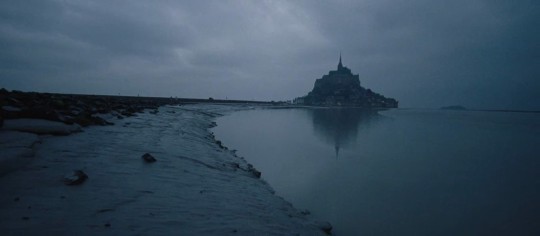

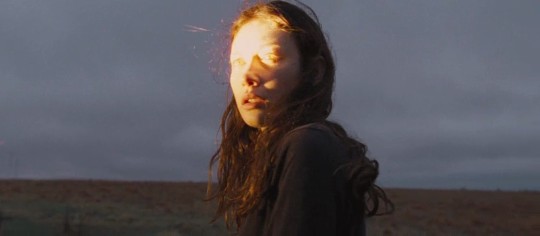
#bruce springsteen#songwriting#music#springsteen#terrence malick#darkness#malick#darkness on the edge of town#the loner thing#cinema#love#rock#soul#Candy's Room#Youtube
4 notes
·
View notes
Text
'We must cultivate an indispensable enchantment. She may be finishing, this era of well-regarded cynicism, of disenchantment as a sign of intelligence.' (Ariane Mnouchkine)
'We are in an era where disenchantment is cultivated. To one who wants to dream, who lives in a sort of poetry, of dream, we say: 'Stop dreaming!' and we kill them, yes, we kill them.'
youtube
Bruce Springsteen & The E Street Band - Land of Hope and Dreams (Live in New York City)
"She may be finishing, this era of well-regarded cynicism, of disenchantment as a sign of intelligence. It wouldn't surprise me if that goes out of fashion - if you have to look gloomy for people to take you seriously"
"This extraordinary gift that few of you have is credulity. Strengthen your credulity. Credulity is believing in the unbelievable."
"We are in an era where disenchantment is cultivated. To one who wants to dream, who lives in a sort of poetry, of dream, we say: 'Stop dreaming!' and we kill them, yes, we kill them."
"We must cultivate an indispensable enchantment."
Ariane Mnouchkine
youtube
Bruce Springsteen & The E Street Band - Land of Hope and Dreams (Live In Barcelona)
5 notes
·
View notes
Text
Bruce Springsteen: 'I have a “personal” relationship with Jesus. I believe deeply in his love, his ability to save.'
Chateaubriand: 'but herein lies the glory of the mystery: Christ was the man of sorrows, and acquainted with griefs; his heart melted like that of a merely human creature, and he never manifested any sign of anger except against insensibility and obduracy of soul. Love one another, was his incessant exhortation.'
'Chasing something in the night'
Bruce Springsteen: “It was a kindness I’ve never forgotten. Over the years as a St. Rose student I had felt enough of Catholicism’s corporal and emotional strain. On my eighth-grade graduation day, I walked away from it all, finished, telling myself, “Never again.” I was free, free, free at last… and I believed it… for quite a while. However, as I grew older, there were certain things about the way I thought, reacted, behaved. I came to ruefully and bemusedly understand that once you’re a Catholic, you’re always a Catholic. So I stopped kidding myself. I don’t often participate in my religion but I know somewhere… deep inside… I’m still on the team.
This was the world where I found the beginnings of my song. In Catholicism, there existed the poetry, danger and darkness that reflected my imagination and my inner self. I found a land of great and harsh beauty, of fantastic stories, of unimaginable punishment and infinite reward. It was a glorious and pathetic place I was either shaped for or fit right into. It has walked alongside me as a waking dream my whole life. So as a young adult I tried to make sense of it. I tried to meet its challenge for the very reasons that there are souls to lose and a kingdom of love to be gained. I laid what I’d absorbed across the hardscrabble lives of my family, friends and neighbors. I turned it into something I could grapple with, understand, something I could even find faith in. As funny as it sounds, I have a “personal” relationship with Jesus. He remains one of my fathers, though as with my own father, I no longer believe in his godly power. I believe deeply in his love, his ability to save… but not to damn… enough of that.”
Bruce Springsteen: BORN TO RUN (book)

‘Well, I believe in the love that you gave me
I believe in the faith that could save me
I believe in the hope
And I pray that some day
It may raise me above these
Badlands’
Bruce Springsteen & The E Street Band - Badlands (London Calling: Live In Hyde Park, 2009)
. . .
Chateaubriand: “but herein lies the glory of the mystery: Christ was the man of sorrows, and acquainted with griefs; his heart melted like that of a merely human creature, and he never manifested any sign of anger except against insensibility and obduracy of soul. Love one another, was his incessant exhortation. Father, he exclaimed, writhing under the torments inflicted by his executioners, forgive them; for they know not what they do. When on the point of quitting his beloved disciples, he was all at once dissolved in tears; he experienced all the terrors of death, all the anguish of the cross; the blood-sweat trickled down his divine cheeks; he complained that his Father had forsaken him. Father, said he, if it be possible, let this chalice pass from me; nevertheless, not as I will, but as thou wilt. Then it was that that expression, fraught with all the sublimity of grief, fell from his lips: —’My soul is sorrowful, even unto death.’”
François-René de Chateaubriand
8 notes
·
View notes
Text
Bruce Springsteen reads: ‘My story. Hoping it would rock your very soul and then pass on, its spirit rendered, to be read, heard, sung and altered by you and your blood, that it might strengthen and help make sense of your story. Go tell it.’
''Cause tramps like us, baby, we were born to run'
“I fought my whole life, studied, played, worked, because I wanted to hear and know the whole story. My story. Our story. And understand as much of it as I could. I wanted to understand in order to free myself of its most damaging influences, its malevolent forces, to celebrate and honor its beauty, its power. And to be able to tell it well to my friends, my family, and to you. I don’t know if I’ve done that, and the devil is always just a day away, but I know this was my young promise to myself, to you. This, I pursued as my service. This, I presented as my long and noisy prayer, my magic trick. Hoping it would rock your very soul and then pass on, its spirit rendered, to be read, heard, sung and altered by you and your blood, that it might strengthen and help make sense of your story. Go tell it.”
Bruce Springsteen: Born to Run, Chapter 79. Audiobook narrated by the author, Bruce Springsteen.
youtube
Video: Born to Run (London Calling: Live In Hyde Park, 2009)
youtube
Video: Bruce Springsteen & The E Street Band - Born to Run (Live In Barcelona)
3 notes
·
View notes
Text
Darcey Bussell / Bruce Springsteen: 'It’s a mad dog’s promenade. So walk tall…or, baby, don’t walk at all.'
‘“dancing, dancing, dancing” / “singing, singing, singing” becomes a triumph of life itself. For in this place, beauty is everywhere balanced by something sinister. The beat is not rock and roll—it is just a rolling heartbeat. And Bruce Springsteen’s voice aches with desire.’
1: Darcey Bussell, ballerina
Video: Song of the Earth
Music: Gustav Mahler
Choreography by Kenneth MacMillan
youtube
2: Bruce Springsteen
Video: New York City Serenade
“Most writers take years to write songs that meld classical virtues with a unique perspective, but Springsteen did it when he was twenty-three, on his second album. “When I write something and I know it’s good,” Springsteen says, “I get a little spark. It’s like a little light that goes off inside me that says, ‘Bing! You’ve just fulfilled your life’s purpose.’”
“New York City Serenade” is about exactly such moments of self-discovery. Bruce croons it with all the faith of the truly wild and innocent, describing a fool’s paradise and the rules by which one lives within it: “It’s midnight in Manhattan/This is no time to get cute. It’s a mad dog’s promenade. So walk tall…or, baby, don’t walk at all.” In the end, the city and the song merge in a single metaphor:
Hey vibes man, hey jazz man, play me your serenade
Any deeper blue and you’re playin’ in your grave
There’s great delicacy in this song, with its acoustic guitar and light piano, rumbling bass and crying strings. But in the guitar, there’s an edge like a knife, and Bruce’s voice aches with desire. At the very end of the song’s ten minutes, the music glides and soars with a singsong celebration of a junkman, whose “singing, singing, singing” becomes a triumph of life itself. For in this place, beauty is everywhere balanced by something sinister.
It’s as though he were whispering secrets and promises in our ear, drawing us just close enough to make us want to hear more. You can imagine Johnny Shines hearing Robert Johnson’s blues and finding in them something like this that encouraged him to follow the great country bluesman. The beat is not rock and roll—it is just a rolling heartbeat. But it is something very like Springsteen’s own statement of the blues: what it is that matters, how one might gain it, and lose it, and the price paid for the attempt. For if this is not a version of the blues, then it is very like a Pied Piper’s tune; one has about as much hope of resisting.”
Dave Marsh: Bruce Springsteen
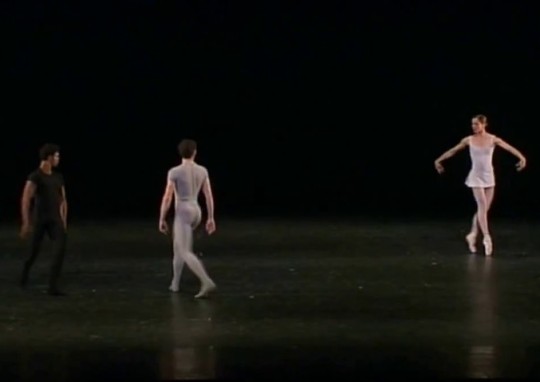
Darcey Bussell
10 notes
·
View notes
Text
Terrence Malick: 'Far from making them mature, which is a myth believed by Americans, suffering, on the contrary, has made them petty, narrow-minded, and tough'
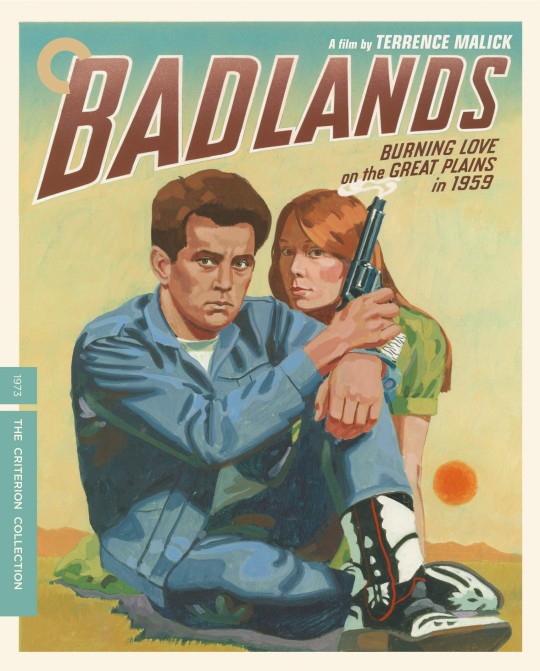
Terrence Malick: “People believe that when you’ve suffered in life, you behave like a wounded animal, displaying your wounds as if they happened yesterday. And that’s often what happens in movies. But in real life, people’s suffering is hidden; it’s their only way to survive. That’s what happens to Kit. Far from making them mature, making them more 'profound’ and harmless, which is a myth believed by Americans, suffering, on the contrary, has made them petty, narrow-minded, and tough. This is how Kit became narcissistic, but not in the sense of seeking the root of his problems; rather, like a poser who doesn’t like being what he is.”
Terrence Malick to Michel Ciment, March 1975. Translated from the french. In Michel Ciment, Petite planète cinématographique
youtube
Bruce Springsteen & The E Street Band - Badlands (Live In Barcelona)

(French:
Terrence Malick : “Les gens croient que lorsqu'on a souffert dans la vie, on se comporte comme un animal blessé, que l'on montre ses blessures comme si elles étaient survenues la veille. Et c'est ce qui se passe souvent au cinéma. Mais dans la vie, la souffrance des gens est cachée, c'est leur seule façon de survivre. C'est ce qui arrive à Kit. Et loin de les avoir grandis, de les avoir rendus plus "profonds” et inoffensifs, ce qui est un mythe auquel croient les Américains, la souffrance, au contraire, les a rendus mesquins, étroits d'esprit et durs. C'est ainsi que Kit est devenu narcissique, mais pas dans le sens d'une recherche de la racine de ses problèmes, bien plutôt comme un poseur qui n'aime pas être ce qu'il est.“
Terrence Malick à Michel Ciment, mars 1975. La balade sauvage / Badlands)

6 notes
·
View notes
Text
Bruce Springsteen: I wanted to be great. Also, I wanted to have a sort of apocalyptic grandeur.
'Not forsaking your own inner life force. You know, how do you hold on to those things?'
youtube
Video: Something in the Night Live at The Paramount Theatre 2009
Bruce Springsteen, The Promise (documentary):
“The success we had with Born To Run immediately made me ask, ‘Well, what’s that all about? What’s that mean for me?’ The success brought me an audience. It also separated me from all the things I had been trying to make my connections to my whole life. It frightened me, because I understood that what I had of value was at my core, and that core was rooted into the place I had grown up, the people I had known, the experiences I’d had. If I move away from those things into a sphere of just freedom as pure license, to go about your life as you desire without connection, that’s where a lot of the people I admire drifted away from the essential things that made them great. And more than rich, and more than famous, and more than happy, I wanted to be great.
... I had a reaction to my own good fortune, and I asked myself new questions. I felt a sense of accountability to the people I had grown up alongside. I began to wonder how to address that feeling. All of this led to the turn my writing took on Darkness."
youtube
Video: Darkness on the Edge of Town Live at The Paramount Theatre 2009
Bruce Springsteen: "The song DARKNESS ON THE EDGE OF TOWN builds to that one big moment: ‘I’ll be on that hill ‘cause I can’t stop / I’ll be on that hill with everything I got’.
That was the only answer I had at the time. Not forsaking your own inner life force. You know, how do you hold on to those things? How do we keep those things? How do we do justice and honour to those things? That was the question that that record asked over and over and over again. Adam Raised A Cain – how do we honour our parents? Promised Land – how do we honour the community and where we came from? Factory – how do we honour the life of our brothers or sisters and parents? For some reason that was something that really mattered to me. It mattered to me a lot.
... That was a sort of big… it’s a reckoning with the adult world, with a life of limitations and compromises. But also a life of resilience, and commitment to life. Through the breath in your lungs. How do I keep faith with those things? How do I honour those things? Darkness was a record where I set out to try to understand how to do that.
... Also, I wanted to have a sort of apocalyptic grandeur.”
Bruce Springsteen, documentary: The Promise
6 notes
·
View notes
Text
'Bruce Springsteen identified with Elvis’s career, the way it seemed totally in the artist’s control at one moment, and careening without guidance the next. But he wasn’t about to allow himself to be caught up in anyone’s expectations, as Elvis had done.'
youtube
Adam Raised a Cain (Live at The Paramount Theatre 2009)
"East of Eden, with James Dean, inspired “Adam Raised a Cain.” Bruce came to understand himself and his songs better by viewing the work of filmmakers who could depict almost identical situations a dozen times and yet make each of them different.
Intrigued by the hero others saw in him, Bruce also took a closer look at his own role models. In July, soon after moving to the Record Plant, Bruce and the band found some advance copies of Elvis: What Happened?, Steve Dunleavy’s muckraking book about Presley, in a bookshop around the corner. The influence of the King clicked back in, and for several weeks, the studio took on the look of an Elvis shrine. Bruce identified with Elvis’s career, the way it seemed totally in the artist’s control at one moment, and careening without guidance the next. “He was an artist, and he wanted to be an artist,” Bruce said soon after Presley died, which also summed up Bruce’s feelings about himself. But he wasn’t about to allow himself to be caught up in anyone’s expectations, as Elvis had done. “Mike Appel thought he would be Colonel Parker and I’d be Elvis,” Springsteen would later say. “Only he wasn’t the Colonel, and I wasn’t Elvis.”
The lessons of hype, the lawsuit, the failures of his idol, Elvis, and the natural maturity that came with simply being twenty-eight worked a transformation in Springsteen and his music. If he had sometimes been passive about the way others were exploiting his work, he now saw such apathy as the gravest irresponsibility. In “The Promised Land.” Springsteen says proudly: “Mister I ain’t a boy/No I’m a man.” So Darkness on the Edge of Town evolved into a statement of what had transpired, not in the courtroom or the recording studio, but in Springsteen’s life, and the lives of the sort of people he knew."
Dave Marsh: Bruce Springsteen
6 notes
·
View notes
Text
'“Born To Run,” as lively a piece of music as anyone has ever made, is a song about death. Like the ghost-lovers of “Thunder Road,” the heroes of “Born To Run” are condemned to roam the strip forever, seeking what cannot be found.'

'“Born To Run” is a snapshot of this endlessly circled paradise, girls primping their hair, boys trying on hard faces. It is impossible to hear it without some apprehension—what might happen is anyone’s guess: The place can explode at any second. In its way, “Born To Run,” as lively a piece of music as anyone has ever made, is a song about death; consider the title’s allusion to the old punk tattoo, “Born To Lose.” It is a message of hope, but also a message of doom. Like the ghost-lovers of “Thunder Road,” the heroes of “Born To Run” are condemned to roam the strip forever, seeking what cannot be found.'
Dave Marsh: Bruce Springsteen
youtube
Bruce Springsteen & The E Street Band - Born to Run (Live In Barcelona)
youtube
Bruce Springsteen & The E Street Band - Thunder Road (Live In Barcelona)
10 notes
·
View notes
Text
"Bruce Springsteen is the epitome of what my mother said: 'You never have to push another person down to be buoyant.'" (Mike Appel)
youtube
Mary Queen of Arkansas · Bruce Springsteen
Producer: Mike Appel
INTERVIEW with Mike Appel, producer, manager:
"I was listening to some of the interviews you did last year to mark the 40th anniversary of Born to Run. In one of those interviews you said that Bruce Springsteen never denigrates anybody.
That’s correct.
That’s really quite something.
He is the epitome of what my mother said: You never have to push another person down to be buoyant. You don’t have to do that. You never have to do that unless you don’t feel adequate. I always remember my mother saying that. She died very young.
So he’s a fine person all the way through?
Absolutely. Absolutely.
And you had some really hard tussles, legal tussles with him.
Oh, sure I did. No. Both of us are hard-headed. Both of us are stubborn and when provoked, both of us can be nasty and tough and very difficult to deal with. It took a guy like me to stop him. Stop his career. The same guy that was pushing this way now is pushing that way. Everybody was very young and dumb, and the lawyers were rapacious, as they usually are.
It’s the usual greed of attorneys, and things like that and people like that, that are fanning the flames of discontent. It shouldn’t be there. But it is and it happened and it went down and it was what it was.
We all have a purpose in life and my purpose wasn’t to stay with Bruce Springsteen forever. I think it was Jon Landau’s purpose, or a good portion of his purpose in life, to be with Bruce and to guide him and to make him aware of the craft of writing pop mainstream songs. That was going to be their focus, and by god, they did that.
If he’d stayed with you, it would have been different? His career?
Yes, it would’ve been different. It would have had to be different. I mean my head isn’t Jon Landau’s head. My head isn’t Bruce Springsteen’s head.
I’m talking about the music. The music would’ve been different?
I think the music would’ve been different because even when we recorded (the album) Born to Run, Bruce came to me with two songs, both he and Jon came to me. They had a song called, Linda, Let Me Be the One and (another one called) Lonely Night in the Park. And I said, those are the worst two songs I’ve ever heard in my entire life. They are not going on this album. I mean, over my dead body.
Because they were what?
They were poor examples of trying to do a pop song. They can’t be on this album.
Because they were more formulaic? Less creative and wild?
Absolutely.
So if he’d stayed with you, he would have made better music and he would’ve had less success?
He may very well have had less success, but I’m not a guy that is oblivious to pop songs. Remember, I come from that world and my attitude was there’s always a way to make great music. Aretha Franklin made great music and she wasn’t wildly poetic. I can still dance to her songs and still move to her songs. I can move to a hundred great songs that aren’t early Bruce Springsteen or Born to Run Bruce Springsteen. And they made hits and they were good. The lyrics were cool. I mean, listen to Goffin and King. Gerry Goffin was a great lyricist. A lot of the Carole King songs are good. Pop songs. Not bad.
So you’re saying if he’d stayed with you he could’ve made better music and had as much success?
I think so. I think so. I think so. Because he has it within him to do it for sure. He can do it. Bruce can do it."
INTERVIEW with Mike Appel
By DAVID HOROVITZ, 2016
2 notes
·
View notes
Text
'“singing, singing, singing” becomes a triumph of life itself. For in this place, beauty is everywhere balanced by something sinister. The beat is not rock and roll—it is just a rolling heartbeat. And Bruce Springsteen’s voice aches with desire.'
youtube
"Most writers take years to write songs that meld classical virtues with a unique perspective, but Springsteen did it when he was twenty-three, on his second album. “When I write something and I know it’s good,” Springsteen says, “I get a little spark. It’s like a little light that goes off inside me that says, ‘Bing! You’ve just fulfilled your life’s purpose.’”
“New York City Serenade” is about exactly such moments of self-discovery. Bruce croons it with all the faith of the truly wild and innocent, describing a fool’s paradise and the rules by which one lives within it: “It’s midnight in Manhattan/This is no time to get cute. It’s a mad dog’s promenade. So walk tall…or, baby, don’t walk at all.” In the end, the city and the song merge in a single metaphor:
Hey vibes man, hey jazz man, play me your serenade
Any deeper blue and you’re playin’ in your grave
There’s great delicacy in this song, with its acoustic guitar and light piano, rumbling bass and crying strings. But in the guitar, there’s an edge like a knife, and Bruce’s voice aches with desire. At the very end of the song’s ten minutes, the music glides and soars with a singsong celebration of a junkman, whose “singing, singing, singing” becomes a triumph of life itself. For in this place, beauty is everywhere balanced by something sinister.
It’s as though he were whispering secrets and promises in our ear, drawing us just close enough to make us want to hear more. You can imagine Johnny Shines hearing Robert Johnson’s blues and finding in them something like this that encouraged him to follow the great country bluesman. The beat is not rock and roll—it is just a rolling heartbeat. But it is something very like Springsteen’s own statement of the blues: what it is that matters, how one might gain it, and lose it, and the price paid for the attempt. For if this is not a version of the blues, then it is very like a Pied Piper’s tune; one has about as much hope of resisting."
Dave Marsh: Bruce Springsteen
8 notes
·
View notes
Text
The Beauty Of Mulholland Drive - David Lynch
Pierre Lescure (twitter): 'Without a doubt, our greatest source of pride. David did not wait for us to be free, but I have occasionally dreamt that our way of empowering him had allowed him to ask even fewer questions, except those that belong solely to him.' (As the president of Canal+, Pierre Lescure is one of those who enabled David Lynch to make Mulholland Drive.)
youtube
The Beauty Of Mulholland Drive - David Lynch
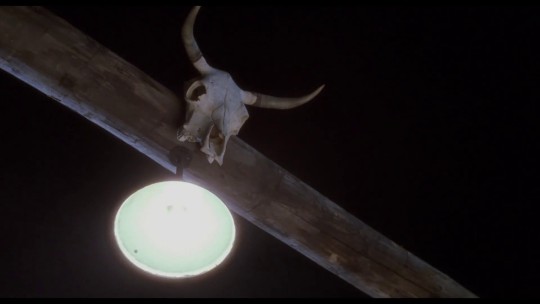

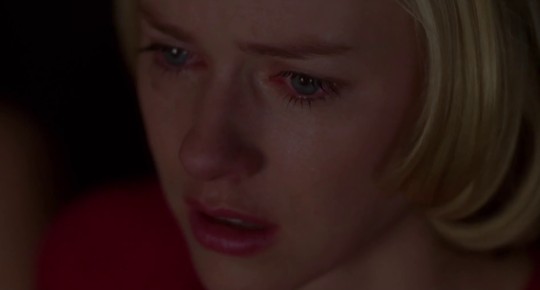
10 notes
·
View notes
Text
Patti Smith: 'Like a dream of Thomas Mann. Bayreuth as a Magic Mountain. Wagner as the cure.'
Audio: A delightful passage from Parsifal
The premiere of Patti Smith in Bayreuth.
Patti Smith: "As I sat in my quiet hotel room, I suddenly realized that in those short, half-awake hours, an irrational love for this place had taken hold of me. Like a dream of Thomas Mann. Bayreuth as a Magic Mountain. Wagner as the cure.
For Parsifal, I dressed carefully. As a novice, I wanted to approach the performance as a ritual. I sided with Sarah Bernhardt and dressed like a man. I felt like a lost, stoic character from a novella by Stefan Zweig, studying the mystery of the Grail, the spear, and the blooming staff.
During the overture. I was completely focused. The orchestra, conducted by Pierre Boulez, had the brilliance and class of a Rembrandt."
(Translated from German:
Patti Smith: Bayreuther Festspielen: Frankensteins Braut, Christophs Hase und ich, Die Zeit, 11. August 2005)
...
Audio: Richard Wagner - Parsifal - Pierre Boulez - Bayreuther Festspiele, 2004
Paul Valéry: "A delightful passage from Parsifal. At dawn, after an infinite night of torment and despair, King Amfortas, tortured by an equivocal wound mysteriously inflicted by voluptuousness on his soul, on his flesh, indivisibly punished, has his litter carried into the countryside. The Impure comes to breathe the freshness of the morning. There are only a few measures, but incomparable. Perhaps, this essence of dawn, all of breeze and trembling leaves, miraculously achieved, seized by Richard Wagner, a marvel without return insinuated by him into a huge work entirely based on the eternal repetition of hieratic themes, implies even more experience and science, and more assimilated, - a deeper transformation of a man into a master of his art, than the vast sum of the work?" (Translated from French: Paul Valéry, Autour de Corot, 1932, Pièces sur l'art)
2 notes
·
View notes